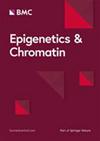Folate deficiency reduced aberrant level of DOT1L-mediated histone H3K79 methylation causes disruptive SHH gene expression involved in neural tube defects
IF 3.5
2区 生物学
Q1 GENETICS & HEREDITY
引用次数: 0
Abstract
Neural tube defects (NTDs) are one of the most severe congenital abnormalities characterized by failures of the neural tube to close during early embryogenesis. Maternal folate deficiency could impact the occurrence of NTDs, however, the mechanisms involved in the cause of NTDs are poorly defined. Here, we report that histone H3 methyltransferase disruptor of telomeric silencing 1-like (DOT1L) expression was significantly downregulated, and low levels of H3K79me2 were found in the corresponding NTDs samples with their maternal serum folate under low levels. Using ChIP-seq assays, we found that a decrease of H3K79me2 downregulates the expression of Shh and Sufu in mouse embryonic stem cells (mESC) under folate deficiency. Interestingly, folate antagonist methotrexate treatment led to attenuation of H3K79me2 due to Dot1l, affecting Shh and Sufu genes regulation. Upon further analysis, we find that the genes Shh and Sufu are both downregulated in the brain tissues of mice and humans with NTDs. There was a positive correlation between the transcription levels of Shh, Sufu and the protein levels of DOT1L by Pearson correlation analysis. Our results indicate that abnormal Shh and Sufu genes expression reduced by aberrant Dot1l-mediated H3K79me2 levels could be the cause of NTDs occurrence.叶酸缺乏会降低 DOT1L 介导的组蛋白 H3K79 甲基化的异常水平,导致 SHH 基因表达紊乱,从而引发神经管缺陷
神经管缺陷(NTDs)是最严重的先天性畸形之一,其特征是在胚胎发生早期神经管关闭失败。母体叶酸缺乏可能影响被忽视热带病的发生,然而,被忽视热带病发生的机制尚不明确。在这里,我们报道了组蛋白H3甲基转移酶干扰物端粒沉默1样(DOT1L)的表达显著下调,并且在相应的NTDs样本中发现低水平的H3K79me2,其母体血清叶酸水平较低。通过ChIP-seq分析,我们发现叶酸缺乏小鼠胚胎干细胞(mESC)中H3K79me2的减少下调了Shh和Sufu的表达。有趣的是,叶酸拮抗剂甲氨蝶呤处理导致H3K79me2因dot11而衰减,影响Shh和Sufu基因的调控。通过进一步分析,我们发现Shh和Sufu基因在患有ntd的小鼠和人类脑组织中都下调。Pearson相关分析发现Shh、Sufu的转录水平与DOT1L蛋白水平呈正相关。我们的研究结果表明,dot1l介导的H3K79me2水平异常降低Shh和Sufu基因的异常表达可能是NTDs发生的原因。
本文章由计算机程序翻译,如有差异,请以英文原文为准。
求助全文
约1分钟内获得全文
求助全文
来源期刊

Epigenetics & Chromatin
GENETICS & HEREDITY-
CiteScore
7.00
自引率
0.00%
发文量
35
审稿时长
1 months
期刊介绍:
Epigenetics & Chromatin is a peer-reviewed, open access, online journal that publishes research, and reviews, providing novel insights into epigenetic inheritance and chromatin-based interactions. The journal aims to understand how gene and chromosomal elements are regulated and their activities maintained during processes such as cell division, differentiation and environmental alteration.
 求助内容:
求助内容: 应助结果提醒方式:
应助结果提醒方式:


